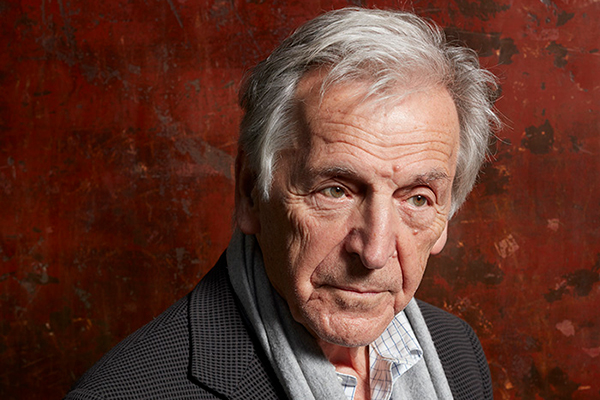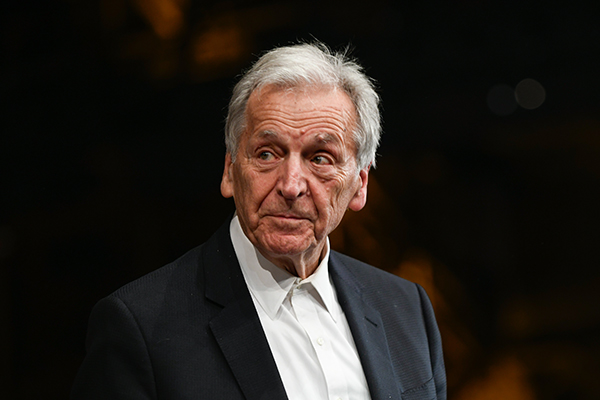Costa-Gavras,
a life of cinema
PostED ON 12.10.2024
Where shall we begin? Is this the filmmaker who turned down The Godfather, even handed to him on a platter by the head of Paramount? Is this the man who was on the verge on becoming President of his native country, Greece? Who also knew Salvador Allende intimately, just a few months before the coup that overthrew him in 1973? Who received a handwritten project by Gaddafi himself, which he hastily refused? Costa-Gavras, 91, has lived a thousand lives, which he recounts in his delectable memoirs, Va où il est impossible d'aller (published by Seuil). He has experienced all the ideological and political turmoil of the second half of the 20th century and the beginning of the 21st, and has remained a lucid, committed - but never dogmatic - witness to them all.

© Paul Grandsard
His encounter with injustice came at a young age: his father's anti-royalist stance forbade Costa-Gavras from attending university in Greece. Upon his arrival in Paris in the mid-1950s, he was quickly sidetracked from any other professional possibility upon his marvellous discovery of the Cinémathèque française. After studying at IDHEC, he became an assistant director, climbing the ranks of the trade and making himself indispensable. He worked for the greats of the era, including Clouzot, René Clair and René Clément, thanks to whom he met Simone Signoret. The Nouvelle Vague was undoubtedly already gaining traction, but he was not keen on joining them (too reactionary for his taste, incidentally). The friendship he forged with Yves Montand and Simone Signoret, iconic stars of the time, helped him make his debut film, The Sleeping Car Murder (1965). The picture starred the two A-list actors, and, more importantly, led to Costa-Gavras becoming acquainted with a particularly enriching circle of intellectuals.
What followed was a cinematic legend, the political film Z, written with Jorge Semprún, which garnered him an award at the Cannes Film Festival and the Oscar for Best Foreign Film. Then there was The Confession, followed by State of Siege (1972), and Missing (1982), which took home the Palme d'Or at Cannes, making Gavras once and for all the great filmmaker who dared denounce all the totalitarianism of the 20th century with no Manichaeism. His talent for highlighting the great violence of societies was still prevalent in the 2000s. With intelligence, he understands that one of the great tyrannies is no longer limited to frontal politics, it involves the more twisted tyranny of money and its excesses. He has made several films on the subject, including Capital (2012).

© Romane Derbelen / Team Mège
Nevertheless, Gavras is not just a director who is a citizen of the world and the current President of the Cinémathèque Française. Much like Ken Loach, whom he admires, he also knows he should not overlook the intimate dimension of his characters' lives. The fatidic moment when it is time to stop and look at the other person, as in the incredible and deeply moving Womanlight (1979), or Hanna K. (1983), because yes, Costa-Gavras is the great all-round filmmaker who takes an interest in everything.
AF
Master class
A conversation with Costa-Gavras
Monday, 14 October at 11.00 am at the Pathé Bellecour – also interpreted in sign language
With the support of ![]()
Costa-Gavras on the programme
Z by Costa-Gavras (1969, 2h07, VFSTA)
UGC Confluence di 13 11h15 | Pathé Bellecour lu 14 10h45 |
Institut Lumière (Villa) je 17 20h30 | Institut Lumière (Villa) je 17 20h45 |
Comœdia sa 19 17h
The Confession by Costa-Gavras (L’Aveu, 1970, 2h19, VFSTA)
Institut Lumière (Hangar) di 13 14h30 | Comœdia ma 15 10h45 |
UGC Confluence me 16 21h | Décines je 17 20h
The Costa-Gavras Century
by Yannick Kergoat (Episodes 1 and 3) and Marie-Pierre Camus (Episode 2)
(Le Siècle de Costa-Gavras, épisodes 1, 2 et 3, Documentary series, 2024)
Episode 1 Pathé Bellecour Mon 14 2:15pm | Episode 2 Pathé Bellecour Sun 13 7pm |
Episode 3 Pathé Bellecour Mon 14 4pm
Premiere
Last Breath by Costa-Gavras (Le Dernier souffle, 2024, 1h40)
Pathé Bellecour Sun 13 8pm

